EdTech
This edtech platform is helping college students make right career choices
Upskilling platform CareerLabs is on a mission to bridge the massive skill gap in India’s higher education which is largely responsible for country’s high unemployment rate. During his stint at BYJU’s, company co-founder Mr PN Santosh realised that the college segment requires reinvigorated focus and a change in the skilling paradigm could only enhance employability. In August 2019, Mr Santosh, along with his former BYJU’S colleagues Krithika Srinivasan and Prasanna Alagesan, launched CareerLabs with an aim to enable 1 million college students to learn and earn better. The platform provides one stop solution to college students with skill-building programmes for higher studies and job placements.
Two years on, CareerLabs, with its unique offering, has become one of the most sought-after upskilling platforms in the country. The Bengaluru-based startup has so far reached out to over one lakh students with 30000 active users and 3000+ paid subscribers. The platform recently teamed up with the education ministry for NEAT 2.0, an initiative to promote the profile building of students across the country and help them find a good job. Mr Santosh tells Plunge Daily about CareerLabs journey so far and its role in bridging the skill gap between academia and industry.
1) CareerLabs has teamed up with AICTE for NEAT 2.0, an initiative to impart employability skills among engineering students. Please tell us more about this project?
A: Yes, we have partnered with the education ministry for the NEAT 2.0 initiative. They were looking for a platform, which is highly scalable and able to deliver value to students. So, we created an AI-enabled profile builder lite version model, specifically for AICTE. The idea is to help engineering students develop employable skills and aptitude for placement. They were pleased with the placement record which we achieved for our first batch of students. We have more than 100 companies actively recruiting from our platform-ranging from tech, electronics, mechanical civil to management sectors. We also have some of the top startups including prominent edtech, fintech, automotive platforms as recruiters. The fact that our focus was also on other engineering streams along with IT also worked in our favour because that’s where other platforms are struggling. As soon as the colleges open, AICTE will be actively pushing this product through various channels across different colleges. They’ll be conducting a lot of workshops across different cities where we will be one of their partners, and we’ll be showcasing this platform to all the college students.
2) CareerLabs is primarily a profile building platform. You help people make right career choices based on their skillset. So, how do you evaluate skillset of a student?
A: Most of the college students have little idea about the career options available after graduation. Whether they want to opt for digital marketing, or UI UX Or they want to get into sales or marketing roles, the lack of clarity only adds to the confusion. So when a student signs up for our program, he is required to undergo a bunch of diagnostic tests. We ask the candidate to take an aptitude test, then we have an auto-evaluation process to analyse his soft skills, then there is a psychometric test. Besides that, we also conduct career interest survey to understand candidate’s aspirations. We also record the career tracks of seniors from a particular college and share them with students so that they don’t restrict themselves getting only into one stream(like IT companies).

The process to evaluate the skillset of a student
Using all these data points including historical data, industry needs, and the students’ skills, the recommendation engine prioritizes the top six career trends where the candidate’s chance to excel is high. We also have mentors who directly engage with students and advise them about their right career tracks. For each of the six career tracks, we give a foundation program. Now the student has to go through the entire program, he has to look at the 10 hour module. And then finally decides which is the right skill set for him in terms of upskill. So, Once he picks up a program and pursues the course which is a mix of video classes, case studies, assignments, quizzes, we set data points to measure his performance. And if there is a problem, we always do course-correction.
3) Does CareerLabs also offer scholarship programs for promising students who may or may not have financial support?
A: Yes, we do offer scholarships. So, we have shortlisted five career tracks where we know there’s a good demand. These are IoT, data science, full stack development, embedded systems and VLSM. With our strong network of recruiters, we provide assured placement for these career tracks. So, for this particular program, we have offered scholarships worth Rs 2 crores for students coming from weaker economic background and those who have performed exceptionally well in our entrance tests. We have been giving them opportunities and some of them have got very lucrative offers. Just yesterday, one of our students who had joined our full stack development program, with a significant reduction in fees, landed a job in a startup with a salary package of 8 lakhs per annum, which is highest in his college campus.
4) So, CareerLabs also acts as a liaison between companies and students helping them with placements. So, could you please tell us about the companies associated with you and average placements that happen through your platform?
A: Our first cohort of students are passing out now. These are pre-final year students who joined us in August 2019. So they are graduating now. In terms of placement, we have more than 70 to 75% of students of the first cohort getting placed. And the students, who have not been placed, are the ones who have not completed the course due to hiccups in academic session. So once the exams are done, they’re going to get placed. Speaking about our recruiting partners, we have top IT firms, tech consulting firms, electronic firms, the top three auto companies recruiting from our platform. The salary range depends on the domain, for example- for mechanical and civil, the salary is not as high as IT domain. So the salary is ranging from anywhere from four lakhs to even up to 24 lakhs per annum. In IT and sales and marketing domains, the placement has gone to an extent that the supply of students is significantly lower compared to the demand. So, we are also entering into agreement with some companies that will allow us to recruit on their behalf.
5) There’s a massive skill gap in our education system, because even after devoting years in engineering, management and other streams, majority of students could not get a job. How do you see this problem?
A: It’s a classical supply-demand issue. A couple of decades back, we used to have fewer engineers, simply because the number of colleges were limited. Getting into an engineering college was difficult. But now, there are too many colleges as a result seats are remaining vacant. So what is happening is that students are seeing the supply option, since the number of colleges are significantly higher than demand. The engineering admissions are actually dropping, more numbers are moving towards non-engineering. Because they seem to get more value out of that compared to engineering, which is very sad and unfortunate.
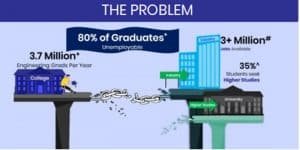
The second big problem is that we need to think in terms of the college ecosystem. How many of us want to really become teachers? How many of them want to become a teacher? Not many of us because it doesn’t seem to be very lucrative. but the edtech industry is booming because of good teachers. Byju’s and other edtech firms have got high valuation because of good educators. But at our schools, there’s a problem and at the engineering level, it’s even worse. So it has become such a sad scenario that a person usually thinks of becoming a teacher only after he could not get a job in any company. so there is a problem in terms of supply of good teachers, which is also resulting in skill gap among students.
I will give you an example- the faculty at ISB Hyderabad, where I did my MBA, was exceptional. The reason being the compensation is very good and a lot of importance is given to research. At ISB, weightage is given to research over usual classes and that’s the kind of ecosystem we need to create. Thirdly, we also need better regulation for our colleges, participation of industry in terms of skilling the students is also extremely critical.
6) Covid has changed a lot of things for tech-based startups in India. Please tell us about the challenges or the opportunities that came along with Covid.
A: One sector which has immensely benefitted from the pandemic is edtech. Earlier, we did not find too much favour from college students and their parents also had doubts about online learning. So, even if we pitched best of courses, faculty and special attention to each student, they usually settled for a local Institute offering average content, just because they can go sit down and study over there. Now, due to covid the adoption rate of online learning has shot up drastically. . Without covid, it could have taken another 10-15 years for this kind of digital shift. Now, the only challenge, which I have observed, is the digital fatigue among students. A good number of colleges and offline training companies which have shifted to online mode, believe whatever was done in an offline class should be done in front of a system but it doesn’t work like that. Online learning in order to be more effective and engaging requires a different set of tools and mechanism as compared to an offline class. So, if a student attends an online class in the morning, joins his study groups in the noon, and by the time he joins us in the evening, he could be tired or less attentive. So, this is the challenge we’re trying to overcome using different means.
7) CareerLabs has mostly catered to engineering students or those coming from technical background. So, are you also planning to expand into commerce and arts stream?
A: Yes, our first and second cohort of students have come from engineering backgrounds but 30% of these students picked non-engineering courses like management and design. So we know what really works in the non engineering domain also. So with that learning, we have started working on BCom, BBA and MBA courses . In fact, we will soon be launching a separate short placement program for MBAs in sales and marketing.
Also Read: CareerLabs partners with HelloIntern to accelerate industry-relevant internships
8) Please tell us about CareerLabs’ funding and also what, according to you, make investors bullish about this platform.
A: We have a very good set of investors. We have McKinsey Partners invested in us and they are also helping us in building our industry connect. Some of the ISB professors have also invested in our platform. They have helped us in creating engaging content because they are from the academic field. We also have 4 to 5 CXOs invested in our platform. We also have the support of Global Founders Capital, one of the largest European funds. We raised around USD 2.1 million in February March.
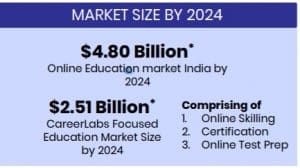
CareerLabs aims to enhance its market size to USD 2.51 bn by 2024
The reason why investors are bullish about our company is because we are probably the only platform in India which helps students both in terms of higher education and placement. Also, we have not restricted ourselves to one stream wherever there is an industry demand we have a career track aligned with it. Another reason for investor confidence is that unlike most of the edtech companies, which are notorious for burning money, we not only broke even but also generated USD 1 min revenue in the first year of operation.


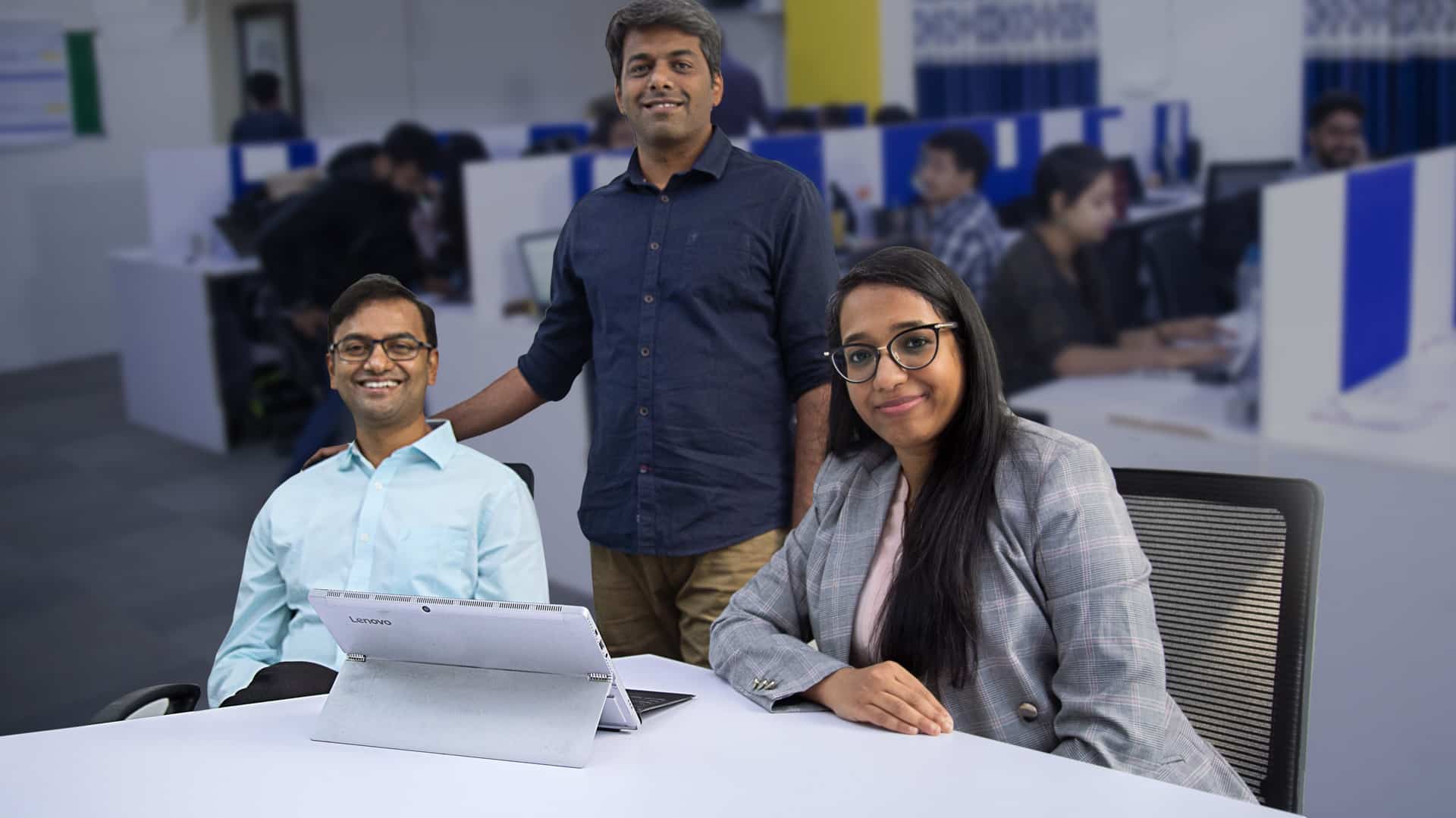




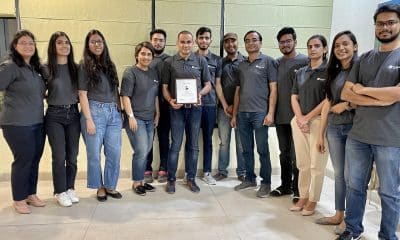
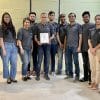
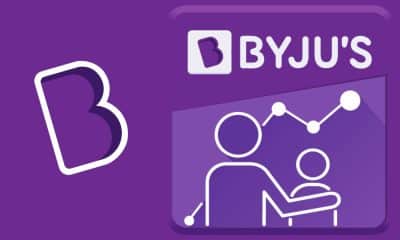

































Pingback: How water purifier brand Kent looks to transform India's IoT space
Pingback: Vernacular EdTech platform Vidyakul raises USD 500K in Bridge Round
Pingback: Fieldproxy raises 2 crores as part of its seed funding round
Pingback: Kerala HC directs Centre to allow Covishield 2nd dose after four weeks
Pingback: Centre approves Rs 10,683 crore PLI scheme for textile sector
Pingback: User reports on spam do not undermine end-to-end encryption: WhatsApp
Pingback: How TopRankers emerged as a popular platform for alternative careers
Pingback: Addverb to expand robots manufacturing by 10 times in next financial year
Pingback: This former World Bank exec is pioneering a silent-revolution in India's education system
Pingback: This fintech startup is changing the game in India's microlending space